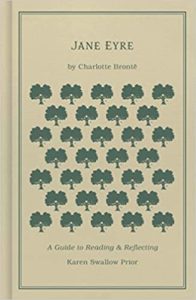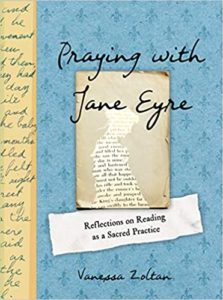Jane Eyre By Her Side (And Yours)
Being someone who treats a text as sacred is asking a work of art to do mysterious things to you; it is the most vulnerable way to interact with a text.”
– Vanessa Zoltan
Imagine a beloved book as a friend. You carry her with you everywhere you go, so you can pop in anytime. At any moment you can pull up a paragraph and know exactly where you are in the story, and, all at once, you can find something wholly new. That is part of what it means to practice sacred reading. And no one knows more about that practice than Vanessa Zoltan, author of Praying with Jane Eyre. She describes a summer when she worked an internship as a hospital chaplain, carrying into every room her personal bible, Charlotte Brontë’s Jane Eyre.
Zoltan is the founder and one of the co-hosts of Harry Potter and the Sacred Text and other podcasts. Each week she and her HP co-host read a chapter and do some type of sacred reading practice, such as lectio divina or havruta. She does not think the book is perfect but that it is worthy of reading sacredly. She advocates reading any beloved text with 1) faith—that the text always has something to say, 2) rigor—that commitment to a text, even when it is hard, pays off, and 3) community—that reading together yields great gifts. I might sum those points up by saying sacred reading involves reading carefully and generously.
I have written about Jane Eyre before. (She is worth rereading.) This third read was done in community, with a friend who’d never read it. She’s a fan of Karen Swallow Prior and wanted to read Prior’s new edition of Charlotte Bronte’s classic, with notes and reflection questions. My friend and I also both listened to a nine-part podcast with Prior and hosts discussing the book.
Before writing her own edition, Prior already owned multiple copies of Jane Eyre — each purchased at a different time and each with a different personal meaning. And even after that rigorous exercise, discussing the book on the podcast yielded fresh insights. That is the benefit of sacred reading.
Zoltan and Prior are two very different women who both love Jane Eyre. Zoltan is a Jewish atheist, and she explores both identities in her book. Prior is a Christian, who reads Jane Eyre as “the story of a Christian seeking to be faithful within a nominally Christian society (similar to our own), which fails to affirm the basic human dignity of one who is poor and connected.” Jane is certainly not the kind of Christian any other character in the book expects her to be. She likes “Revelations, and the book of Daniel, and Genesis and Samuel, and a little bit of Exodus, and some parts of Kings and Chronicles, and Job and Jonah.” But Psalms? “Psalms are not interesting,” she says, and is condemned as wicked for saying so.
Each time I read Jane Eyre — each time with a little more attention and comprehension — I find I am reading a parallel story of becoming myself. One of my favorite things about Jane is that despite her life’s many trials, she is always, 100 percent authentically herself. I cannot always say the same for myself. I would like to be able to say that.
It is the interior life of Jane, not the exterior one, which is so believable. The ‘self’ the novel portrays, far more than the events of the story, rings true. The voice of the girl who says, ‘I resisted all the way.’ The voice of the woman who demands in the face of the worst pain of her painful life, ‘Do you think I am an automaton?–a machine without feelings? … Do you think, because I am poor, obscure, plain, and little, I am soulless and heartless? You think wrong! –I have as much soul as you–and full as much heart!’ And the voice of the modern self who asserts, ‘I am not an angel … and I will not be one till I die: I will be myself.'”
– Karen Swallow Prior
As I prepared this post I did a sacred reading practice called florilegia, which combines favorite sentences from a book, making them into a new “bouquet of flowers” and seeing what new things they might have to say when paired. I took “I will be myself,” which Prior highlights, and “I must keep in good health, and not die,” to which Zoltan dedicates an entire chapter.
I will be myself / I must keep in good health, and not die. Here Jane sounds like a motivational speaker quoting her own bestselling autobiography: I am Jane! Hear me roar! And yet, I know these scenes. She is not roaring but asserting herself in the presence of powerful men. She is drawing lines for her own life.
I must keep in good health, and not die. / I will be myself. Here I sense Jane’s smile of self-knowledge. Part of her good psychological health is being herself, a woman who is full of feeling, neither stoic nor manic. She accepts herself as a woman who is free to dislike Psalms and to like fairies quite a lot.
And for me? What vulnerable questions is Jane asking me? How can I keep in good health today? With whom am I not being myself? I certainly cannot keep from dying, but how might I live in such a way that when death came I could go with few regrets?
Your Turn
1. Try it! Take two favorite sentences from a beloved book. Arrange them in one order and then in the opposite one. Write out what you notice. How might these different bouquets apply to your life?
2. What is your association with Jane Eyre?
3. Share your August pages. Sliced, started, and abandoned are all fair game.
August’s Pages
Poetry
Love Poems from God, translated and edited by Daniel Ladinsky
Cane, by Jean Toomer (a Tweetspeak rec!)
Picture Books and Early Readers
Cooper and the Big Apple, by Camille Cohn, illus. Riley Cohn (mother-daughter duo)
Llama Llama Misses Mama, by Anna Dewdney (Join us for Children’s Book Club next Friday, September 10!)
Middle Grade and YA
The Children of the Green Knowe, L.M. Boston
Grownups
The Goblins Who Stole a Sexton, by Charles Dickens (short story within The Pickwick Papers)
The Autobiography of Santa Claus, as told to Jeff Guinn (reread select chapters)
The Midnight Library, by Matt Haig
Deacon King Kong, by James McBride
Jane Eyre, Charlotte Brontë, reading guide by Karen Swallow Prior
Praying with Jane Eyre, Vanessa Zoltan
Photo by Sharon Tate Soberon, Creative Commons, via Flickr. Post by Megan Willome.
Browse more Reading Generously
I loved this book. As soon as I finished, I began reading it again.”
—David Lee Garrison, author of Playing Bach in the D. C. Metro
- Perspective: The Two, The Only: Calvin and Hobbes - December 16, 2022
- Children’s Book Club: A Very Haunted Christmas - December 9, 2022
- By Heart: ‘The night is darkening round me’ by Emily Brontë - December 2, 2022




Glynn says
I read “Jane Eyre” years ago, as in decades ago. I think I’m inspired enough to read it again.
August reading
Fiction
Third and Long by Bob Katz
The Turn of the Screw by Henry James
Coming Home to the Loch by Hannah Ellis
OOF by Strobe Witherspoon
Back in the saddle by Ruth Logan Herne
Brush Creek Cowboy by Liz Isaacson
Paradise Palms by Paul Haddad
Healed by Dean Skinner
Mystery
A Fatal Secret by Faith Martin
Down Among the Dead by Damien Boyd
When Stars Grow Dark by Scott Hunter
A Fatal Truth by Faith Martin
Dying Inside by Damien Boyd
Shakespeare Project
As You Like It
Macbeth
Troilus and Cressida
Antony and Cleopatra
Poetry and Criticism
bone by Yrsa Daley-Ward
The Truth of You by Iain Thomas
Let Our Memories Escape by Thomas Colquith
Spoon River America by Jason Stacy
Drama
Our Town by Thornton Wilder
Megan Willome says
Oh, I love “Our Town” so much! Whenever I visit a cemetery, I think of that third act.
I highly recommend Karen Swallow Prior’s edition. Four of the six are out: “Sense and Sensibility,” “Heart of Darkness,” “Frankenstein,” and “Jane Eyre,” and the two coming are “The Scarlet Letter” and “Tess of the D’Urbervilles.”
Bethany R. says
Wonderful piece here, Megan, thank you for sharing it. I chose this book to be my silent reading companion in 10th grade. A lovely “friend” to visit each school day.
Megan Willome says
What a lovely practice for a teacher to institutesnd a worthy choice by you.
Kelly Oberheiden says
This article is beautifully written. I agree with you that in our lives, we have beloved books who are our friends, who accompany and teach us to reflect on the way we live. Thank you for sharing your thoughts!
Kelly | Author of Kindheart
Megan Willome says
Thank you, Kelly. Do you have a book that has kept you company?